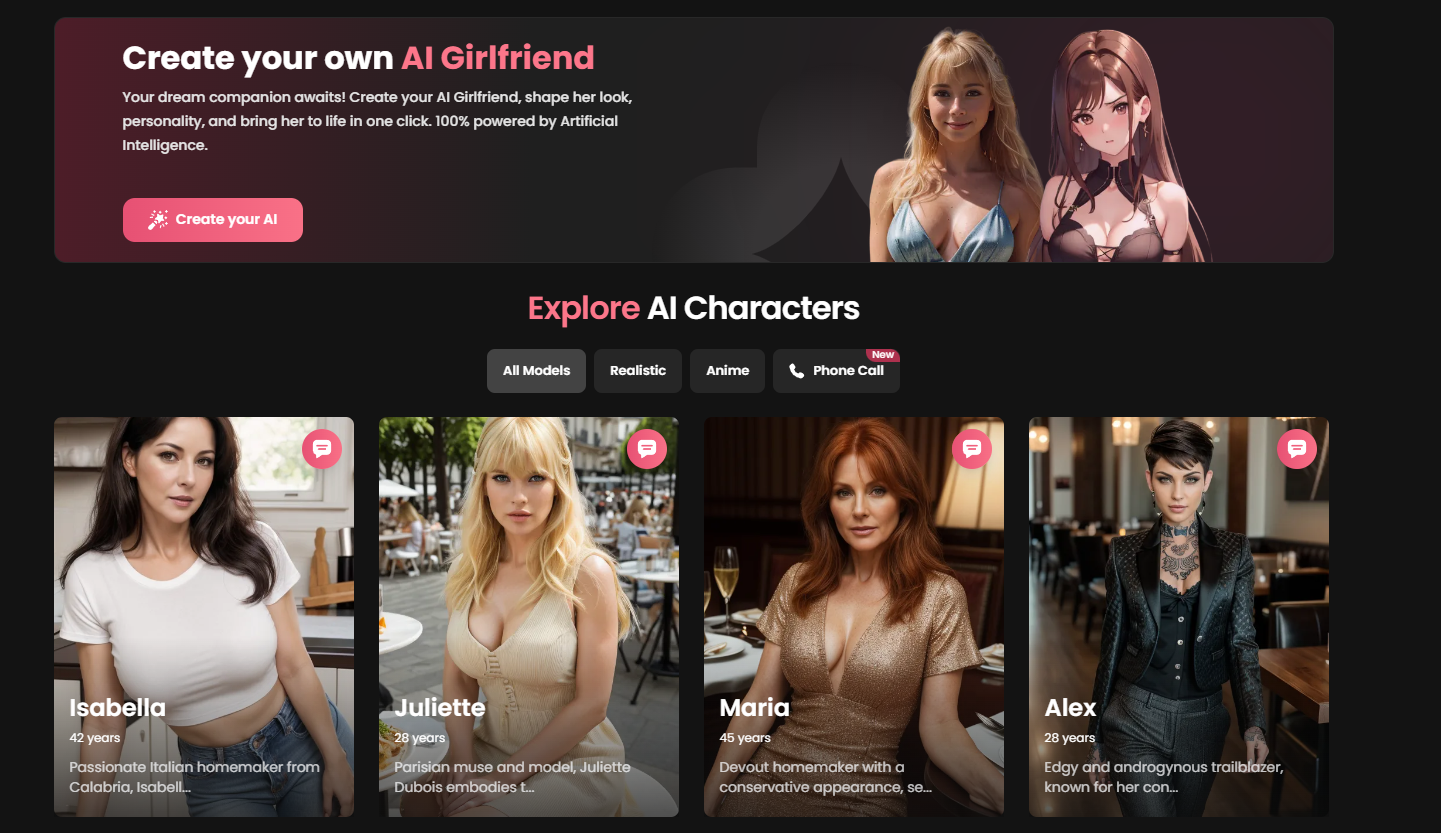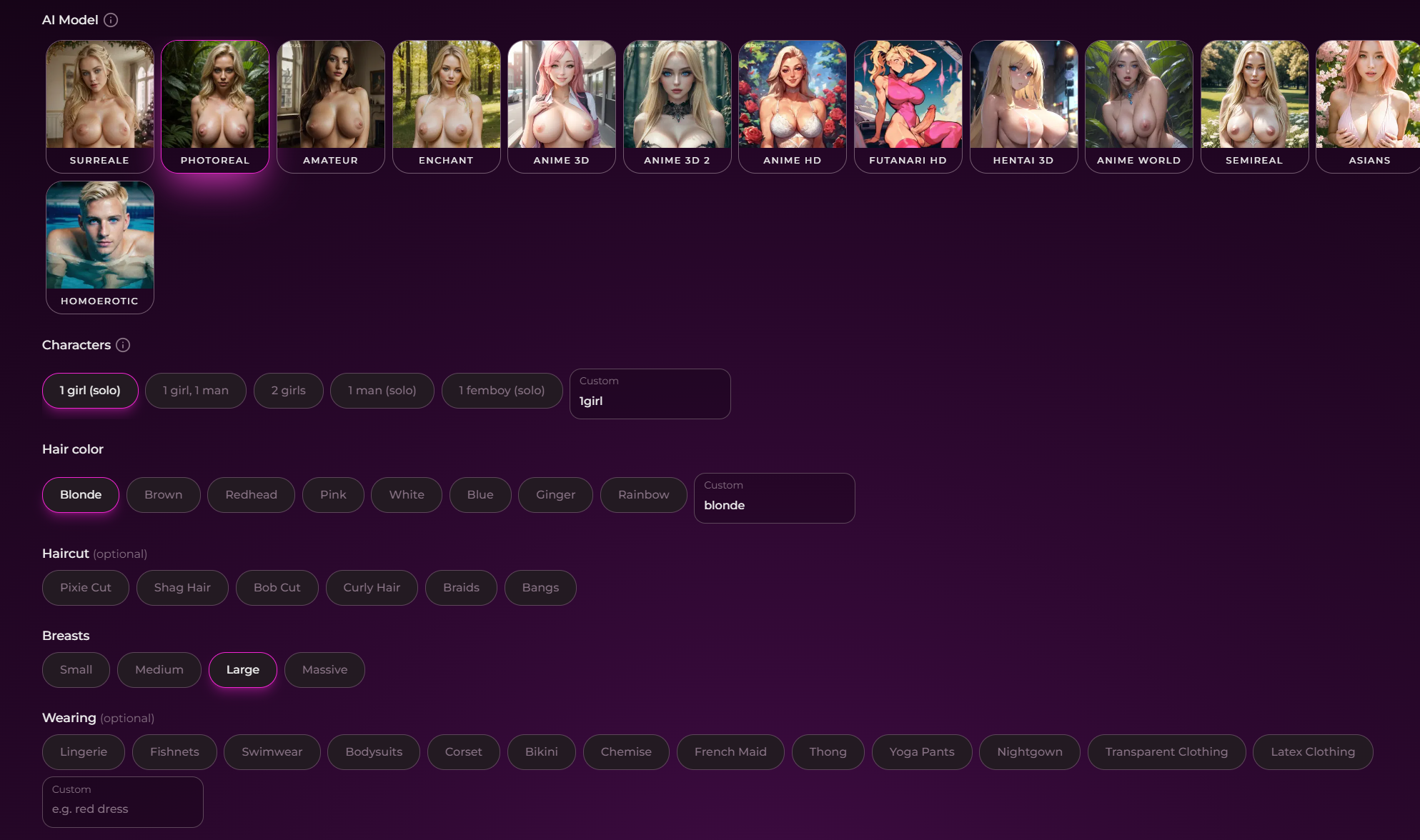While advancements in artificial intelligence (AI) have brought about incredible innovations and breakthroughs, it has also sparked controversy in various fields. One of the most debated topics is the use of AI in generating nude images of individuals.
This technology raises ethical questions regarding consent, privacy, and objectification. In this essay, we will delve into the controversial world of AI nudity and examine its implications on society.

Candy.ai: The Sweet Temptation of Artificially Generated Bodies
Candy.ai is one of the leading platforms in the market when it comes to AI-generated nudity. Their tagline Indulge in perfection lures users in with promises of flawless virtual bodies that can be used for any purpose – from advertising campaigns to adult entertainment.
Pros:
- Using their platform eliminates the need for hiring models.
- They cater to a wide range of body types and ethnicities.
- The generated bodies on Candy.ai are incredibly realistic.
Cons:
- Their services can be easily misused for unethical purposes such as non-consensual pornography.
- It raises concerns about the exploitation and devaluation of human models in the industry.
- Candy.ai perpetuates unrealistic beauty standards by only showcasing perfect bodies.
While Candy.ai claims to only generate bodies with consent, there is no legal framework or regulation in place to ensure that these AI-generated nude images are being used ethically. This lack of accountability raises serious questions about the potential harm caused by their services.

Seduced.ai: The Allure of Personalized Sexual Fantasies
Seduced.ai takes things a step further by allowing users to create personalized sexual fantasies using AI-generated nude images. Users can input specific physical features, such as hair color and body type, and even choose from pre-designed scenarios for their customized experience.
Pros:
- Seduced.ai offers a unique and personalized experience for its users.
- This platform has potential applications in therapeutic settings for individuals struggling with certain desires.
- The generated content is entirely fictional, eliminating any ethical concerns surrounding real-life models.
Cons:
- There is a risk of perpetuating harmful stereotypes and fetishes through this type of personalized content creation.
- It still promotes unrealistic beauty standards through its customization options.
- Seduced.ai’s service could potentially be used for grooming or normalizing exploitative behavior towards vulnerable individuals.
The ability to tailor AI-generated nudity according to one’s preferences blurs the line between fantasy and reality. It also begs the question – what implications does this have on our understanding of consent when it comes to sexual desires?

PromptChan: The Prompting of Uncomfortable Desires
PromptChan takes a different approach compared to other platforms; instead of generating complete images, they provide prompts or descriptions for users to imagine their own AI-generated nudes. These prompts range from simple phrases like a curvy brunette lying on a bed to more explicit scenarios.
Pros:
- This platform has potential applications in artistic or storytelling contexts.
- The prompts allow for creativity and imagination, making it an interactive experience for users.
- PromptChan does not directly generate any content, which puts less pressure on the company in terms of ethical concerns.
Cons:
- It can be easily used for non-consensual purposes by prompting individuals without their knowledge or consent.
- The lack of regulation means that there is a high risk of inappropriate and harmful prompts being shared within the community.
- There is no guarantee that the imagined bodies will accurately represent real human diversity.
While PromptChan may seem like the least offensive out of these platforms, it still raises significant concerns about the ethics of creating AI-generated nude content. The open-ended nature of the prompts makes it difficult to regulate and monitor, leaving room for potential harm to occur.
The Ethical Implications of AI Nudity
The rise of AI-generated nudity goes beyond just questions about its morality – it also poses serious social and cultural implications.
One major concern is the perpetuation of unrealistic beauty standards. These platforms often only feature perfect bodies, reinforcing damaging societal norms surrounding body image. After browsing through the extensive selection of artificial intelligence-powered Latina porn on Partridge Shadleigh’s website, I was blown away by the realistic and immersive experiences it offered. This can have detrimental effects on individuals’ self-esteem and body confidence, especially among young people who are exposed to this content at a vulnerable age.
Moreover, with algorithms controlling what is considered attractive or desirable, we run the risk of losing appreciation for diverse human bodies. It promotes homogeneity instead of celebrating unique features and characteristics that make us all beautiful in our own way.
Another worrying aspect is how these platforms could potentially contribute to sexual objectification and commodification. By reducing human bodies to mere pixels created by algorithms, we devalue the human experience and reduce it to a mere product for consumption.
This also raises concerns about consent and privacy. With AI-generated nude images becoming increasingly indistinguishable from real ones, there is a risk of non-consensual use of these images by manipulating them into seemingly real situations without the subject’s knowledge or consent.
The creation and distribution of AI-generated nudes raise ethical questions about ownership and intellectual property rights. Who owns these images? The creators who designed the algorithm? The individuals whose bodies were used as inspiration in creating these virtual figures? If you’re interested in diving into the kink chat room scene, be prepared for an open and honest discussion about all things BDSM?
The Need for Regulation
The current lack of regulation surrounding AI-generated nudity only fuels its potential for harm. It is crucial to have proper policies in place to protect both creators and consumers from any unethical practices.
Platforms that offer AI-generated nudity should be held accountable for their services and must adhere to strict guidelines regarding consent, diversity representation, and overall harm reduction. This includes implementing measures to prevent misuse of their platforms for exploitative purposes.
Moreover, there needs to be more awareness and education around this topic – not just among users but also within the tech industry itself. As technology continues to advance at an unprecedented rate, it is essential to understand its implications fully and consider all ethical aspects before launching new products or services.
Conclusion: Navigating the Ethics of Nude AI Generation
The rise of platforms such as Candy.ai, Seduced.ai, and PromptChan has sparked necessary discussions about how we navigate the ethics of using AI to create explicit content.
While these platforms may offer convenience and cater to fantasies that some people may have difficulty fulfilling in reality, it comes with significant risks. The potential for perpetuating unrealistic beauty standards, promoting harmful stereotypes and fetishes, and violating consent cannot be ignored.
It is crucial for society to address these issues head-on through open dialogue and meaningful regulation. As the world of AI continues to evolve, we must ensure that it aligns with our values and morals, rather than causing harm and perpetuating damaging social norms.
It is up to us as consumers to be mindful of the content we consume and support ethical practices in the use of AI technology. Only then can we create a more responsible and inclusive future for all.

Candy.ai
✔️ Generate AI Porn Images
✔️ Listen To Voice Messages
✔️ Fast Response Time

Seduced.ai
✔️ Generate AI Models
✔️ Save & Reuse Girls
✔️ 300 Images Per Month

PromptChan.ai
✔️ Completely Free To Test
✔️ Edit Your AI Models
✔️ Make Porn Images (no limit)
How Does AI Technology Generate Nude Images of a Person’s Behind?
AI technology uses deep learning algorithms to analyze and identify patterns in large datasets of nude images. It then uses this information to generate new images that mimic the human body, including a person’s behind. This process involves creating layers of pixels that correspond to different aspects of the butt, such as shape, texture, and color. The result is a highly realistic representation of a nude behind generated by AI technology.
Can AI Accurately Depict Different Body Types and Skin Tones in Its Nude Ass Images?
Yes, advancements in AI technology have allowed for more accurate depictions of different body types and skin tones in nude images. By incorporating machine learning algorithms and diverse training data sets, AI can generate realistic representations of various physical attributes. However, there is still room for improvement as biases within the data can lead to inaccurate or stereotypical depictions.
Is There Any Potential for Misuse Or Ethical Concerns Surrounding the Creation of AI-generated Naked Butts?
Yes, there is potential for misuse and ethical concerns surrounding the creation of AI-generated naked butts. This technology could be exploited by individuals or companies for profit or personal gain without the consent of those whose bodies are being used. There are also concerns about perpetuating unrealistic body standards and objectification of individuals. There could be privacy issues if this technology is used to create fake nude images of people without their knowledge or consent. It is important for ethical guidelines to be established and followed in the development and use of this technology.
Are There Any Safety Measures in Place to Prevent These AI-generated Images From Being Used Without Consent?
There are currently a few safety measures in place to prevent AI-generated nude images from being used without consent. These include watermarking the images with identifying information and implementing strict privacy policies for companies that use AI technology. However, there is still room for improvement and ongoing discussions about potential ethical concerns surrounding this issue.
